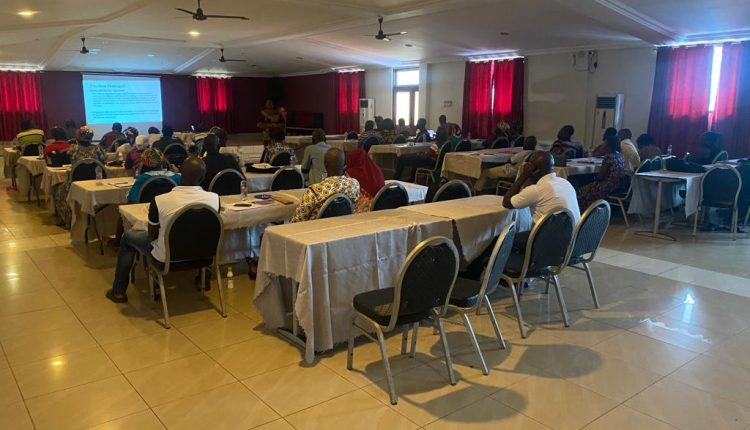Wacam, The Fund For Global Human Rights provide Paralegal Training for Mining Communities in Ahafo Region
“Paralegals are to carry out public education programmes focusing on the law and the basic rights of their communities: by explaining basic legal materials to their community members, and organising workshops to train community members on their rights,”
Wacam, in collaboration with The Fund for Global Human Rights (TFGHR), has equipped representatives of mining companies in the Ahafo Region with paralegal knowledge to guide and empower them in their dealings with Newmont Ghana Gold Limited (NGGL).
About 50 participants drawn from five communities—Yamfo, Adrobaa, Techire, Susuanso and Afrisipakrom in the Tano North Municipality of the Ahafo Region— were taken through the fundamental human rights and legal frameworks on the mining sector in the country including a presentation on the review of the Minerals and Mining Act, Act 703 as enshrined in the 1992 Constitution.
Addressing the participants at a workshop in Sunyani on Thursday, May 18, 2023, the Technical Director of Wacam, a human rights and environmental mining and advocacy non-governmental organisation (NGO), Mr. Kwaku Afari, said a paralegal is one who is equipped with basic knowledge and skills in law to provide legal and other assistance to communities.
He continued that such a person must have as a tool some important provisions of the 1992 Constitution including Chapter 5 on Fundamental Human Rights.
While emphasising that paralegals were not lawyers, Mr. Afari, who is a lawyer, said paralegals are expected to provide basic legal advice to the communities in which they live in.
“Paralegals are to carry out public education programmes focusing on the law and the basic rights of their communities: by explaining basic legal materials to their community members, and organising workshops to train community members on their rights,” he clarified.
On tools for paralegal work, he said they include the national constitution, statutes involving laws passed by Parliament such as the Minerals and Mining Act 2006, Act 703, international conventions and treaties on human rights among others.
Taking the participants through what fundamental human rights entails, Mr. Afari explained that human rights are basic standards without which people cannot live a respectable life, stating that they are inherent in human beings.
Some of these rights, he said, are categorised into civil and political rights which include right to work, right to property, liberty and security of person; economic, social and cultural rights etc.
He also touched on some of the human rights violations in mining communities. He said these included destruction of houses without payment of compensation, destruction of farms and farmlands, pollution of water bodies and health related issues.
However, Mr. Afari pointed out that such rights could be curtailed in emergency situations, citing Covid-19 in the country to buttress his case.
In a presentation on a Review of the Minerals and Mining Act, Act 703, the Associate Executive Director of Wacam, Mrs. Hannah Owusu-Koranteng, reiterated that it was crucial that the challenges in the Act were addressed.
She indicated that Section 4 of Act 703 that focuses on the minister having the power to reserve land for mining should be properly defined.
According to her, Wacam believes that this section should clearly demarcate forest reserves and protected areas as land not being the subject of mineral right.
On section 13 (1) of Act 703 that allows the minister within 60 days to notify an applicant in writing from the Minerals Commission of the decision on an application, Mrs. Owusu-Koranteng said this notice should not only be given after the application has been approved, but more importantly after the license has been granted.
Speaking to the media, Ms. Hilda Vaadi, a participant from Yamfo, intimated that she has gained a lot of knowledge from the training.
“I will use this knowledge to help my father fight and protect his property in Yamfo,” she asserted.
Another participant, Ali Baba Mohammed, a farmer in Yamfo, said he will used the knowledge gained through the training to prevent Newmont from exploiting him.
“It will also help us guard and protect our water bodies, farms and farmlands from being destroyed by mi mining companies,” he averred.










